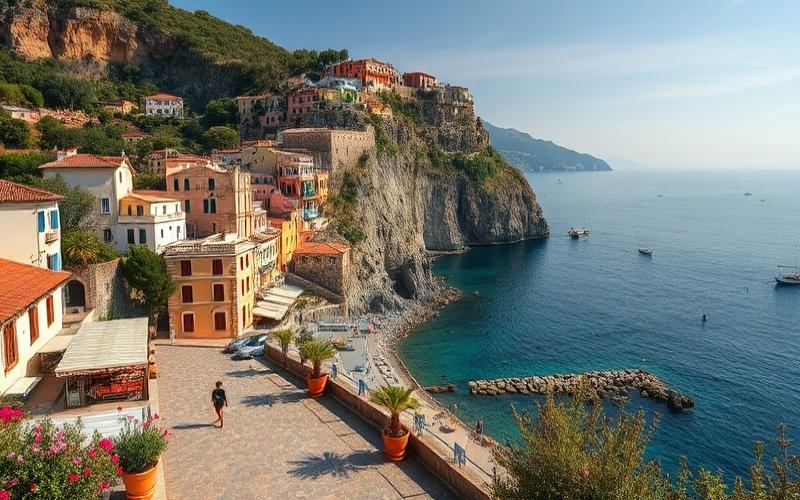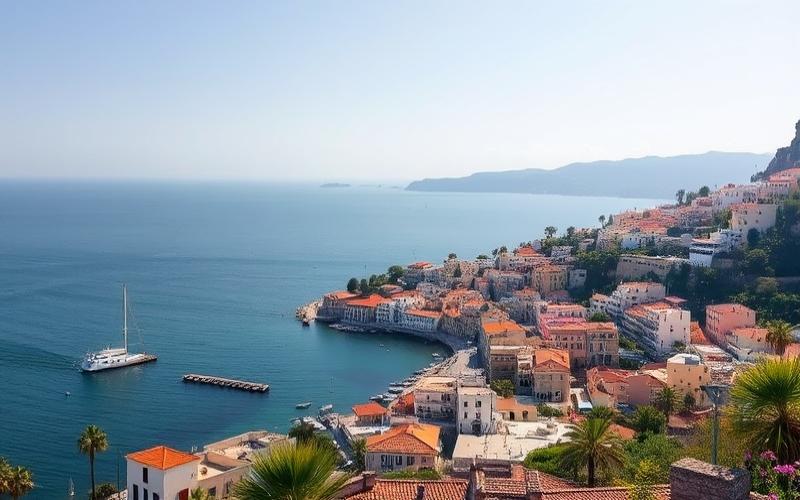
 Published on and written by Cyril Jarnias
Published on and written by Cyril Jarnias
Greece, with its picturesque landscapes, rich cultural heritage, and relaxed lifestyle, is attracting more and more expatriates seeking a new life under the Mediterranean sun. But beyond the charm of the Greek islands and the appeal of the Hellenic dolce vita, what is the real cost of living in this country? Is it truly possible to live comfortably in Greece on a reasonable budget? In this article, we’ll dive into the details of the cost of living in Greece for expatriates, examining different aspects of daily life and providing concrete comparisons to help you better plan your Greek adventure.
An Overview: Greece, an Economical Destination in Europe
Let’s start with good news for future expatriates: the cost of living in Greece is generally lower than in many other European countries. Indeed, according to the latest data, the cost of living in Greece is on average 20% lower than in France. This significant difference is felt in many aspects of daily life, from grocery shopping to leisure activities, including housing.
However, it’s important to note that local purchasing power is also lower, with a difference of about 46% compared to France. This means that although prices are lower, local salaries are as well. For an expatriate maintaining income from their home country or working for an international company, this can translate to increased purchasing power and potentially higher quality of life.
Regional disparities must also be considered. Major cities like Athens or Thessaloniki tend to be more expensive than small towns or rural areas. Similarly, popular tourist islands like Santorini or Mykonos can have a significantly higher cost of living, especially during the peak summer season.
Good to know:
Greece offers a cost of living about 20% lower than France, but with significant variations depending on the region. Expatriates maintaining foreign income can benefit from advantageous purchasing power.
Housing: Attractive Rents, But Watch Out for Disparities
Housing often represents the largest portion of an expatriate’s budget. In Greece, the good news continues, as rents are generally more affordable than in many other European countries. However, prices can vary considerably depending on location and property type.
In Athens, the country’s economic and cultural heart, rents for a one-bedroom apartment in the city center range between 400 and 700 euros per month. Outside the center, these prices drop to between 300 and 500 euros. For a larger three-bedroom apartment, expect to pay between 750 and 1100 euros in the city center, and between 600 and 850 euros in the suburbs.
These prices are significantly lower than those in other European capitals. For example, in Paris, a similar apartment would easily cost double, or even triple. Even compared to cities like Madrid or Lisbon, Athens remains competitive in terms of housing costs.
In smaller towns or rural areas, prices are even more attractive. It’s not uncommon to find comfortable apartments for less than 300 euros per month. However, on popular tourist islands, prices can rise significantly, especially during the summer season.
For expatriates considering a long-term stay, purchasing property can be an interesting option. Real estate prices in Greece remain relatively low compared to other European countries, although they have increased in recent years. Additionally, Greece offers attractive tax incentives for foreign real estate investors.
Good to know:
Rents in Greece are generally 30 to 40% cheaper than in France, with one-bedroom apartments in Athens ranging from 400 to 700 euros in the city center. Property purchase can be an interesting option for a long-term stay.
Food and Groceries: Savor Mediterranean Freshness at Low Prices
One of the great pleasures of living in Greece is undoubtedly the quality and freshness of its food. The good news is that food products are generally cheaper than in France, with an average difference of about 30%.
In Greek supermarkets, you’ll find basic products at very reasonable prices. For example, a liter of milk costs on average 1.34 euros, a 500g loaf of bread about 1.28 euros, and a dozen eggs 3.60 euros. These prices are slightly lower than those in France.
But it’s especially on fresh fruits and vegetables that you’ll make real savings. Local markets, called “laiki agora,” are a true institution in Greece. You’ll find local and seasonal products at unbeatable prices. It’s not uncommon to leave with a well-filled basket for less than 20 euros.
Meat and fish are also cheaper than in France, although the gap is less pronounced. Dairy products, especially feta cheese, are abundant and affordable.
For lovers of local cuisine, eating Greek is not only delicious but also economical. Traditional tavernas offer hearty meals at very reasonable prices. A complete meal in a mid-range restaurant costs on average 25 euros per person, about 17% less than in France.
Finally, for those who appreciate a glass of wine with their meal, Greece offers excellent local wines at very affordable prices. A bottle of quality wine in a supermarket can cost less than 10 euros.
Good to know:
Food expenses in Greece are on average 30% lower than in France. Local markets offer fresh products at very attractive prices, and eating out remains affordable with an average meal at 25 euros per person.
Transportation: Getting Around Without Breaking the Bank
The transportation system in Greece, although less developed than in some Northern European countries, remains efficient and affordable. Public transportation, especially in large cities, offers excellent value for money.
In Athens, a single public transport ticket costs about 1.62 euros, 10% less than in France. A monthly pass costs about 30 euros, representing a substantial saving of 52% compared to French rates. These prices provide access to the bus, tram, and metro network in Athens, which efficiently serves the capital and its surroundings.
For those who prefer to travel by taxi, rates are also advantageous. The initial charge is about 3.40 euros, and each kilometer costs less than one euro. These prices are significantly lower than those in most European capitals.
If you’re considering buying or renting a car, note that gasoline prices are slightly higher than in France, with a liter of unleaded gasoline costing about 1.86 euros. However, maintenance and insurance costs are generally lower.
For travel between islands or to the mainland, ferries are a popular and relatively economical option. Prices vary depending on distance and season, but generally remain reasonable. For example, a one-way trip from Athens to Santorini by fast ferry can cost between 50 and 80 euros during high season.
Finally, for longer trips, Greece has an efficient and inexpensive intercity bus network (KTEL). It’s an excellent option for exploring the country at a lower cost.
Good to know:
Public transportation in Greece is about 50% cheaper than in France, with a monthly pass in Athens costing only 30 euros. Taxis are also affordable, but gasoline prices are slightly higher.
Leisure and Culture: Enjoy Greek Riches Without Breaking the Bank
Greece is renowned for its cultural and historical richness, and fortunately, enjoying this cultural offering doesn’t cost a fortune. Expatriates will find many leisure options at very reasonable prices.
Entrance fees to museums and archaeological sites are generally affordable, especially compared to rates in other European countries. For example, admission to the Acropolis in Athens, one of the country’s most iconic sites, costs 20 euros during high season. Additionally, many sites offer reduced rates for EU residents and free days throughout the year.
For movie enthusiasts, a ticket costs on average 8.4 euros, 30% less than in France. Theaters also offer shows at attractive prices, often with discounts for residents.
Sports activities are also affordable. A monthly gym membership costs on average 45 euros, 38% more than in France, but this price remains reasonable compared to other European countries. Renting a tennis court for an hour costs about 27 euros.
Beaches, one of Greece’s main attractions, are mostly free to access. Even on organized beaches, renting sunbeds and umbrellas remains affordable, usually between 5 and 10 euros per day.
For nightlife, prices vary considerably depending on the location. In a traditional taverna, a local beer costs about 5 euros, while in trendy bars in Athens or on tourist islands, prices can be higher, especially during high season.
Finally, let’s not forget that many activities in Greece are free: walking through the picturesque alleys of historic towns, enjoying the magnificent sunsets over the sea, or participating in the many local festivals that regularly enliven towns and villages.
Good to know:
Leisure and cultural activities in Greece are generally cheaper than in France, with affordable museum entries and many free options. Beaches are often free to access, and outings remain reasonable, except in very touristy areas.
Health and Education: Accessible Public Services
Health and education are two crucial aspects for expatriates, especially for those moving with their families. In Greece, these essential services are generally of good quality and financially accessible.
The Greek healthcare system offers universal coverage for all legal residents, including expatriates. Public healthcare is free or low-cost for people registered with the Greek social security system (EFKA). However, many expatriates choose to take out complementary private health insurance to benefit from shorter waiting times and a greater choice of practitioners. The costs of these private insurances are generally lower than those in France or other Western European countries.
In terms of medical costs, a consultation with a general practitioner costs about 40 euros, while a visit to a specialist can cost between 60 and 100 euros. These prices are comparable, or even slightly lower, than those in France.
Regarding education, the Greek public system is free for all residents, including expatriates. The quality of education is generally good, although classes are mainly taught in Greek. For expatriate families who prefer an international education, there are several international schools, mainly in Athens and Thessaloniki. Tuition fees at these institutions vary considerably, ranging from 7,000 to 13,000 euros per year depending on the school and level of study.
For higher education, Greek public universities are free for EU nationals and offer reduced tuition for international students. Classes are generally taught in Greek, but more and more programs in English are offered, especially at the master’s level.
Good to know:
The Greek public healthcare system is accessible to resident expatriates, with consultation costs comparable to France. Public education is free, while international schools cost between 7,000 and 13,000 euros per year.
Overall Budget: How Much to Plan for Comfortable Living in Greece?
After reviewing the different aspects of the cost of living in Greece, it’s time to take stock of the overall budget to plan for an expatriate. Generally, a monthly budget of 1,500 to 2,000 euros is estimated to allow a single person to live comfortably in Greece, while a family of four will need about 2,500 to 3,500 euros per month.
Here is an approximate breakdown of monthly expenses for a couple of expatriates living in Athens:
- Rent (2-room apartment in city center): 600-800 euros
- Utilities (electricity, water, heating, internet): 150-200 euros
- Food: 400-500 euros
- Transportation (monthly pass for two people): 60 euros
- Leisure and outings: 200-300 euros
- Private health insurance: 100-150 euros
- Miscellaneous (clothing, phone, etc.): 200-300 euros
This total budget of about 1,700 to 2,300 euros per month allows for comfortable living in the Greek capital, with the possibility to go out regularly, enjoy cultural attractions, and even save some money.
It’s important to note that this budget can be significantly reduced by choosing to live in a smaller town or rural area. In these regions, the same standard of living can be maintained with a monthly budget of 1,200 to 1,800 euros for a couple.
For families with children, the main additional costs will be related to education (if you opt for an international school) and larger housing. A three-bedroom apartment in downtown Athens can cost between 800 and 1,200 euros per month.
Finally, don’t forget to consider your personal lifestyle. If you enjoy traveling frequently between islands, dining regularly in upscale restaurants, or practicing expensive sports, your budget will need to be adjusted accordingly.
Good to know:
A monthly budget of 1,500 to 2,000 euros for a single person, or 2,500 to 3,500 euros for a family of four, generally allows for comfortable living in Greece. This budget can be reduced by living outside major cities.
Conclusion: Greece, a Wise Choice for Budget-Conscious Expatriates
In conclusion, Greece offers excellent value for money for expatriates. With a cost of living generally 20 to 30% lower than in France, while benefiting from a high quality of life, pleasant climate, and rich culture, Greece positions itself as a destination of choice for those looking to optimize their budget while fully enjoying life.
Affordable rents, fresh and inexpensive food, efficient and cheap public transportation, as well as access to quality healthcare and education at reasonable prices, make Greece an attractive option for a wide range of expatriates, from young professionals to retirees.
However, it’s important to plan your move well and consider regional disparities. Major cities and tourist islands can be significantly more expensive than small towns or rural areas. Additionally, mastering the Greek language, although not essential, can greatly facilitate integration and potentially reduce some costs.
Ultimately, living in Greece offers the possibility to enjoy an enviable Mediterranean lifestyle, rich in culture and experiences, while maintaining a reasonable budget. It’s an opportunity for many to improve their quality of life without necessarily increasing their expenses.
Disclaimer: The information provided on this website is for informational purposes only and does not constitute financial, legal, or professional advice. We encourage you to consult qualified experts before making any investment, real estate, or expatriation decisions. Although we strive to maintain up-to-date and accurate information, we do not guarantee the completeness, accuracy, or timeliness of the proposed content. As investment and expatriation involve risks, we disclaim any liability for potential losses or damages arising from the use of this site. Your use of this site confirms your acceptance of these terms and your understanding of the associated risks.






















